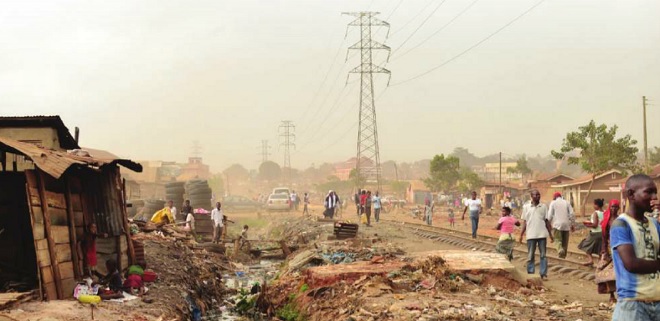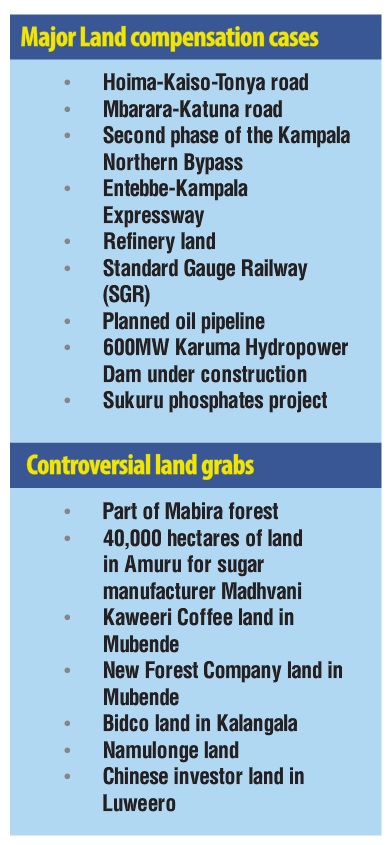
Top lawyers reveal details of land grab plot
Top land lawyers are warning that land grabbers could be behind claims that the government intends to amend the Land Act and start acquiring land before compensating its owners and politicians are saying it could lead to war or worse. “These two are threats that if we are not careful, can lead to a very serious breakdown of law and order in this country. Indeed, they are issues that can lead to war and our country should not take them lightly,” said the defacto leader of the opposition, Dr Kizza Besigye while explaining to journalists that the proposed reforms will intensify land grabbing.
Museveni’s government grabbed people’s ranches and gave them to squatters, they grabbed people’s money through currency reform, and have been grabbing public land,” says top land lawyer Peter Walubiri, “But this is going to open a big fight. It might lead a big political crisis.”
In an interview with The Independent, Walubiri said racketeers could be hiding behind the move to grab citizens land.
“There is no serious investor who cannot afford land,” Walubiri told The Independent, “What we are dealing with are racketeers who are baptised investors, apportioned land, only for them to sell it the next day without investing anything.”
Walubiri’s charged claims are a fraction of the vitriol being poured out since it emerged that President Yoweri Museveni okayed plans to change the law to allow the government to take over land owned privately by citizens before compensating them.
Based on claims by Walubiri and others, it would now appear the President could be facing major fight with land owners across the country.
Land law experts say while Museveni’s advisers say the proposal is part of the wider drive to improve service delivery and push development, critics are castigating the proposal as intended to willy-nilly grab people’s land.
Matters are not helped by deep rooted public suspicions that have over the years been fueled by major land grabs by top government officials, military officials and investors with the knowledge of the president.
Many recall that the outgoing Minister of State for Lands, Aida Nantaba, spoke of a “mafia in government” that is bent on grabbing private land for personal gain. While handing over to the new minister on June 22, she revealed that she had refused a Shs3 billion bribe from persons that wanted to grab land from the Namulonge Agricultural and Animal Production Research Institute. She said she reported the matters to Museveni but no action was taken.
“We are cautioning you that some cases have embarrassingly involved connivance between the ministry technical staff and powerful mafia groups that grant several land titles on one piece of land, which leads normally to the eviction of the poor from land they occupied since colonial times,’’ said Nantaba who is now the Minister of State for Information & Communication Technology.

Eyebrows are now being raised over the coincidence that just a few weeks later, the government is proposing a tough law to grab land before compensation.
Another top land lawyer, Yusuf Nsibambi, who is the chairman of the Kampala Land Board, says all this is unconstitutional and could be hiding the real motive.
“The framers of the constitution decided that government shouldn’t own land,” Nsibambi told The Independent, “they decided that land should belong to the people. Why are these people trying to grab people’s land?”
If government wants to acquire land, he explained, the law already caters for that. Government is required to first explain to people’s representatives—Members of Parliament—why they need the land, then get the prevailing market price, compensate people and then use the land, Nsibambi explained.
“But this idea of giving government a blank cheque to compulsorily acquire land without even compensating people, is against the constitution and the law,” he said, “I reject it.”
Nsibambi also cautioned that starting this debate might be a red herring intended to divert people’s attention.
“Because government knows that people are passionate about land,” Nsibambi said, “they are bringing up this issue of compulsory acquisitions to divert them from the critical questions of governance that people are currently focusing on.”
Nsibambi is a veteran in the fight to defend public land. He was recently involved in a ferocious legal battle defending the powers of the Kampala Land Board against Kampala Capital City Authority (KCCA) authorities who wanted to render his unit irrelevant arguing that when Kampala became a city authority, the board ceased to exist.
The authorities were advised by the Solicitor General that the board still had powers but kept pushing to edge out Nsibambi. He, however, defeated them in court and believes that the move by the city authorities was intended to pave way for more land grabs.
Article 26 of the Uganda constitution provides for compulsory acquisition of land by the government where the land “is necessary for public use or in the interest of defence, public safety, public order, public morality or public health”.
But this is on condition that government makes “prompt payment of fair and adequate compensation, prior to the taking of possession or acquisition of the property”.
However, under the new proposed reforms, government is looking to expand these grounds and include development or more specifically investment purposes, and also wants powers to acquire the land and compensate people after the acquisition has taken place to the chagrin of many.
 The Independent Uganda: You get the Truth we Pay the Price
The Independent Uganda: You get the Truth we Pay the Price






“This means that developments can go on as negotiations for compensation are also ongoing.”
HOW CAN THIS HAPPEN??
its like saying, ” let me buy your house, kick you out and start using it, let me start enjoying the benefits from it while we negotiate the price and payment.”